No matter if you travel to Germany for fun or for work, knowing when the different public German Bank Holidays are will help you to avoid closed shops and find out about some interesting traditions and customs. Public or bank holidays in Germany are a bit confusing because the observance of them depends often of the region you are in. Germany is a federal republic made up of 16 states, called 'Bundesländer' in German. To make it a bit easier for you I have first listed those that are observed nationwide and then the ones that are only observed in some regions. I hope that helps you both with your travel plans and with your general knowledge about Germany and its culture. I also added some background information, images of the events and videos. Plus some personal experiences how some of the holidays were celebrated in our home. So, if you wonder about the 'accent' of this article, here the explanation – I am German ;-)

Public Bank Holidays in Germany, German Feast Days explained
by Sam
No matter if you travel to Germany for fun or for work, knowing when the different public German Bank Holidays are will help you to avoid closed shops and find out about some ...
1st January New Year's Day
(in German: Neujahrstag)
Like in other countries, the eve of the first day of the new year is celebrated to mark the beginning of something new, a new beginning. Traditionally this is done in Germany with a big meal with typical, traditional food such as Herring Salad in the case of our family, followed by a firework starting exactly at midnight, this can either take place at home, in the family circle or in a restaurant and then often includes dance.
Other German New Year's traditions are lead melting. Hot, melted lead is carefully poured in cold water and the resulting figures are interpreted to foretell the events of the coming year. Other important symbols that are part of a New Year's table decorations are a little pig with a money piece in its back (symbolizing wealth for the New Year) and chimney sweeper figurines (symbolizing luck for the New Year). So, the actual festivities are taking place the evening and the night of the 31st December to the 1st January. And on the actual New Years Day you ask, what are Germans doing then?
To say the truth, we need this public holiday to recover from the events of the previous evening and night ;-) Because believe it or not, the day of the celebrations, the 31st December is a completely normal working day for most Germans, no wonder that we need the 1stJanuary to recover from it!
Oh, and before I forget to mention it, this night when the year changes is called 'Sylvester' in German, in honor of the Saint of the day, St. Sylvester.
March / April Good Friday
(in German: Karfreitag)
One of the few movable holidays in the German calendar, this day commemorates the death of Jesus Christ on the cross. It is, together with the following Saturday a 'silent holiday' (no public dance etc allowed). This is criticized by many secular voices in Germany (funny enough not by members of other religions, something to think about). A silent holiday means not only no public dance, disco etc allowed, it also means that all public entertainment events have to take consideration of the nature of the day. For example, some theater performances are allowed, but not mere comedies. Whilst a lot of humanists argue that it is up to each individual if they partake in such events or not, others, not only Christians, argue that public events like concerts etc always effect those around them, if they want them or not.
To put things in comparison, there are only two silent holidays (the other is the Saturday following Good Friday) that fall on a weekday in the whole year in Germany. Hardly any hardship as there are still many days in the year left over to party.
So, how is the date for this Easter holiday calculated? Glad you asked!
In the western churches the date is determined by the following formula: Good Friday is the Friday before Easter Sunday, which is always the first Sunday after the Paschal moon, also called the first full moon in Spring. And the first full moon in spring is the one that occurs or follows the vernal equinox on 21st March.
Sounds complicated? Lets try this:
First Spring Equinox (21st March), then the first full moon after the 21st March, then the first Sunday after the first full moon = Easter Sunday and Good Friday is the Friday before Easter Sunday!
Therefor the earliest possible date for Good Friday is the 20th March and the latest possible the 23rd April. The dates for the coming years will be:
- 31st March (2013)
- 20th April (2014)
- 5th April (2015)
The reason for all this is that the date of Easter is calculated after the Jewish calendar, due to the fact that the first Easter took place on the Jewish holiday of Pessach or Passover. And the Jewish calendar is a lunar calendar, means it works following the moon phases rather than simply counting days and following the solar calendar like we in Europe do.
Good Friday traditions in Germany depend largely if you are in a more catholic or more protestant area, but even in homes of Germans that aren't exactly churchgoers, you will most likely not encounter any meat that day. Hence, a typical Good Friday dish would be fish or something entirely vegetarian. But as church attendance goes also down in Germany, this is becoming more and more a tradition rather than a case of religious observance. As for other events that take place on this day: Processions and stations of the cross can be seen often in the more catholic regions of Germany like Bavaria, whilst the protestant Good Friday liturgy takes predominantly place in the churches. But for all Christians, Good Friday marks the beginning of the most important feast of the year – Easter. There are no secular traditions that are observed on Good Friday as far as I know, perhaps because you can't make a profit with Lent!
Easter Decorations
 |  |  |
| Lighted Easter Egg Decoration Only $18.95 | Wreath Eggs and Pips 16" Easter Decor... Only $24.49 | Nifty Easter Egg Carousel, White |
 |  |  |
| Nifty Easter Egg Carousel, Pink Only $17.99 | Pack of 8 Shelf Sitting Playful White... | Lighted Climbing Easter Bunnies Table... Only $9.97 |
April / March Easter Monday
(in German: Ostermontag)
Whilst Good Friday and Holy Saturday are sad and silent holidays, Easter Sunday and Easter Monday are dedicated to the joy about the resurrection of Jesus Christ from the death – and to the joy of the Easter egg hunt ;-) Good Friday and Holy Saturday are mere Christian and churchy events, but with Easter Sunday the picture changes. Whilst there is no money to be made with Lent and Crucifixion, there are ample possibilities to monetize the rest of Easter. This has let to a curious mixture of pagan and christian elements in the traditional German Easter celebrations. Typical Easter foods, that are even sometimes blessed in catholic churches, are lamb and sweet cakes in lamb or rabbit form. The lamb is a symbol of Christ, 'the lamb of God' and the rabbit is a pagan fertility symbol, 'breeding like the rabbits'.
Another very important food are eggs, as the symbol of new life. Eggs are painted, dyed and otherwise decorated and used to adorn the whole house, often in combination with fresh, flowering spring branches and flowers. On Easter Sunday and Monday the children (and sometimes also the adults) embark on an Easter egg hunt, either in the home, in the garden or even in the local park. Typical gifts parents hide for their children are chocolate eggs (sic!), all sort of sweets and candy, chocolate rabbits and little gifts. BTW, obviously it is not the parents that hide the goodies, it is the Osterhase (the German 'Rabbit of Easter') that comes the previous night with a huge basket full of goodies on his back which he hides in every house and garden. A bit like the spring version of Father Christmas really ;-)
After all the eggs and presents are found a very seasonal game is played in many parts of Germany, it is called 'Ostereiertitschen' and resembles a bit the British game of conquers, just with eggs. The rules are simple, the two opponents try to break each others eggs by 'titsching' (banging) them against each other, whose egg breaks first is the looser and looses his or her egg. There are variations of this in the different regions, but that is the basic idea.
1st May Labor Day
(in German: Erster Mai / Tag der Arbeit)
Did you know that Labor Day has its origins in the United States and not in a communist country, as some might assume? Short history flashback: In 1889 the Second International declared the 1st May as the International Workers' Day, to honor those who died in the so-called Haymarket Affair in Chicago 1886 as they protested for the 8 hours working day (see link below for the full story). This day was soon adopted in many countries allover the world as Labor Day, but not in the US, where Labor Day is celebrated on the first Monday of September. Curious, isn't it?
Germany itself has also a curious relationship to Labor Day, due to the fact that it was a divided country from 1945 – 1989. East Germany, as the good socialists and communists they were (or better said, had to pretend to be), celebrated the 'Worker's Day' in big style, with parades and music included. In West Germany, where I grew up, it was just another day off work with some quiet celebrations organized by the unions. This was not only because of the events on the other side of the inner German border, but also because the national-socialists of Hitlers' third Reich had declared it a national holiday (for a short time) and (ab)used in for their own goals.
So, whilst flags got swung, parades marched and music played in East Germany, we tried to distance ourselves from the socialist connections 'May Day' had in other parts of Europe and in our own past. Instead we declared it a day of dance and – Neopaganism.
Instead of taking part in parades, we did a 'Dance into the May'. On the evening of 30th April, the beginning of 'Walpurgisnacht', dance platforms and maypoles are erected and in some parts of Germany, also bonfires are prepared. The name Walpurgis Night originates in the idea that on this day / night, who carries the name of St. Walburga, the witches fly to a certain mountain to dance with the devil. Whilst that sounds grim, many people think that maypoles, dance and fires have their origin in pagan celebration such as Beltane. What ever you believe, I know that 'dancing into May' is far more fun than 'Marching in May'! So, if you happen to be in Germany during this time, make sure to figure out where the local dance around the maypole will be ;-)
 |  |
| A History of Pagan Europe | Those Crazy Germans! A Lighthearted G... |
April-June Ascension Day
(in German: Christi Himmelfahrt or Auffahrt)
Germany is one of the few countries that holds this day still as a holiday. Ascension Day is a religious holiday that celebrates the ascension (sic!) of the risen Christ into heaven, after he taught his apostles and disciples for 40 days following his resurrection on Easter Day. Therefore Ascension Day always falls on a Thursday and is always 39 days after Easter Sunday and 10 days before Pentecost. The earliest possible date is 30th April and the latest possible is 3rd June. The next dates for Ascension Day are: 9th May (2013), 29th May (2014) and 14th May (2015).
Due to its religious nature, this day is celebrated in Germany mainly by and in the churches. Processions that pray for a good harvest are a frequent happening in catholic, rural parishes.
But the same day sees also the secular holiday of Fathers Day (Vatertag), where the men, no matter if fathers or not, escape their wives and families, for a merry outing into the nature, food and drink included. Sometimes they walk or hike, but more often they take the coach, train or any other form of transport. In some rural areas they set out in decorated, horse drawn carriages! One very important rule on Father's Day is that no women or small children are allowed on these outings. But rules are there to be broken, and lately this day has become more and more a family than a Father's only day. Some people think the origin for this day is because Mothers Day is celebrated in Germany the first Sunday in May, and fathers wanted to have some 'equality' in that matter ;-) In 2008 a very special event took place, Ascension Day and Labor Day fell on the same day, a rare occurrence that will happen the next time in --- 2160.
May / June Whit Monday
(in German: Pfingstmontag)
Another religious holiday here (I bet you never thought that Germans are so religious? ;-)), Whit Monday translates to White Monday and that refers to the white garments that were traditionally worn by baptism candidates. In case you don't know Pentecost (Whit Monday is the Monday after the Sunday of Pentecost) is one of the traditional liturgical season were new Christians got baptized. Its date depends on Easter and so Pentecost is always 50 days after Easter. Pentecost celebrates the outpouring of the Holy Spirit over the firsts Christians and marks the birthday of the church.
Apart of religious ceremonies, there are also a lot of secular and even (neo)pagan traditions alive and kicking in Germany on Pentecost Monday. A lot of these are related to farming and planting, such as the planting of Pentecost Trees (similar to maypoles, but without the dance) or the decorating of oxen with flowers and herbs. When the cattle is brought for the first time to the meadows, this is done in procession and the lead animal, often an oxen, is beautifully decorated. Some people think this tradition has its origin in old pagan rituals that included animal sacrifices. As mentioned, Pentecost is a movable holiday, the dates for the next years for Pentecost Sunday (Whit Sunday) are: 19th May (2013), 8th June (2014) and 24th May (2015).
3rd October Day of German Unity
(in German: Tag der Deutschen Einheit)
This day commemorates the German reunification on 3rd October 1990 after 45 years of forced separation into East and West Germany following the Second World War. This is, btw, the only national German holiday, all others are officially regulated by the Länder (States of the German Federation) even if there is agreement on when to celebrate them, there are still considered 'Ländersache', i.e. affair of the regions.
The official celebration of the Day of German Unity is each year in the capital of another state / Land, following a system based on which Land / state has that year the presidency of the 'Bundesrat' (the Federal Council). Apart of official speeches and the like, a 'citizen party' is organized. All this took place 2010 in Bremen and 2011 in Bonn, but obviously there are also celebrations in other cities, towns and villages. Since the events of The Third Reich and the communist reign in East Germany, many Germans are very wary around everything called 'national', a national holiday that stresses more 'Unity' than 'Nationality' is generally very well received. One great development is also that since 1997 the Mosques in Germany participate and invite everybody to an open day at their local mosque. Muslims in Germany see themselves very much as part of the German society and want to express this also in participating in the celebrations of this day.
25th December Christmas Day
(in German: Weihnachtstag)
Like with New Years Eve, the actual feast day is not a holiday, but the day(s) that follow it. Perhaps a little indication for how much recovery time Germans need after a party ;-) Therefor Christmas is celebrated on the 24th December in the evening. Traditionally first with a big family meal and gifts under the Christmas tree and then all go together to Midnight Mass / service to church. Our pastor at home in Germany used to open the Christmas service always with the same words: 'And a special welcome to those who I only see this single evening in the church!' As I moved to the UK, I found it confusing that there was a service at midnight in church but no special meal and no gifts under the Christmas tree until the next day. Basically in Germany the main celebrations are on the 24th December and we need the following two days to recover from them, whilst in the UK there is some celebration on the 24th, the main feast is on the 25th and the 26th December serves as recovery day. A bit simplified, but true. My husband always said he was lucky when we lived in the UK, he would get two big Christmas meals, one on the evening of the 24th (German Style) and one for lunch at the 25th (British Style).
 |  |  |
| Stille Nacht - A German Christmas Only $15.99 | Weihnachten - A German Christmas Only $14.99 | Christmas Greetings from the Alps - A... Only $14.99 |
26th December St Stephens Day
(in German: Zweiter Weihnachtsfeiertag)
The second day of Christmas in Germany (Boxing Day in the english speaking countries), is dedicated to family visits and eating of the leftovers of the previous two days ;-) Apart of this, it is a rather quiet day dedicated to clean up everything and to prepare to go back to work.
Holidays that are only celebrated in certain parts of Germany
Only one holiday, the Day of German Unity, is a true national holiday, all others just happen to be observed in all states / Länder at the same day ;-) Additionally there are some public holidays that are only observed in certain parts of Germany. This has its origin mostly in the fact that these holidays are particular to one christian denomination and are therefor there observed where this denomination (protestant or Roman-Catholic) is in the majority. Or, in the case of secular holidays, that they are particular to the regional history, but not the history of whole Germany.
6th January Epiphany
(in German: Heilige Drei Könige)
Observed only in three states / Laender (Baden-Württemberg, Bavaria and Saxony-Anhalt) this day is dedicated to the visit of the three magi to baby Jesus. The greek name Epiphanie means 'Manifestation / being made manifest / being made public' and refers to, that this was the first time after his birth that Jesus was recognized as something more than a mere baby. Btw, there is no biblical back-up to the idea that it was three kings that visited. The bible speak only of 'men from the east that studied the stars' and the notion that there were three of them is based on the number of gifts the brought: incense, gold and myrrh. Epiphany ends the 12 days of Christmas. Apart of church services, there are also a few other customs connected to this day. The most interesting ones being:
Nativity sets are now amplified by adding the three kings to them, as they have finally arrived from the Orient ;-)
Carol singing and house blessing: Children, normally connected to a parish or Christian youth group, are going from house to house singing carols. The also often collect for children related third world charities and NGOs, or similar. After having sung and collected, they also mark the house with blessed chalk with the letters '20*C+M+B+last two numbers of the year'. And no, that are not the initials of the traditional names (Caspar, Melchior and Balthazar) of the three kings. That are the initials of the first three words of an old Latin prayer for blessing that starts: 'Christus Mansionem Benedicat' (May Christ bless this dwelling) which is said whilst making this sign.
Another, more pagan, rite is to cleanse house and stable from bad spirits with the help of incense. Here paganism and Christianity meet again, as the incense is often obtained from the church and in same regions it is even the minister that performs the ritual.
A more joyful custom is to 'drink to get strength', apparently the drinking of especially strong beer helps to gain strength for the coming year ;-) This one is especially in Bavaria and Frankonia a favorite!
 |  |
| 1 Liter HB "Hofbrauhaus Munchen" Dimp... Only $24.0 | Prost!: The Story of German Beer |
May / June Corpus Christi
(in German: Fronleichnam )
Celebrated 60 days after Easter Sunday and therefor always on a Thursday, this day made my childish, younger self giggling for many years. Reason being that Leichnam means cadaver in German and Fron resembles closely froh, the German word for happy. Irreverent as children are, we nicknamed this day: 'Happy Cadaver Day' Oops! OK, after this confession of my past sins, here the real meaning of the word:
Corpus Christi is latin and means 'The body of Christ' and refers to the celebration of the real presence of Christ in the Eucharist and is a day that is only observed by the catholic, but not by the protestant, churches in Germany. The German name Fronleichnam comes from the middle-high-german 'vrône lîcham' (vrôn=of the Lord and lîcham=body) giving it the same meaning as the latin name of the day. Back to the date, the earliest possible date for Corpus Christi is 21st May and the latest possible 24th June, the dates for the next years are the following: 30th May (2013), 19th June (2014) and 4th June (2015).
Corpus Christy is only a holiday in Baden-Württemberg, Bavaria, Hessen, Nordrhein-Westfalia, Rhineland-Pfalz and the Saarland, as well as in some regions with predominantly catholic inhabitants such as in Saxony and Thüringen. In the other parts of Germany are special laws in place that allow catholic employees and students to take the day off as an additional holiday, but without payment.
Traditions and customs:
A procession in which the priest carries the monstrance with a consecrated host through the town or village is part of the tradition in many rural, catholic parishes and Mass is often read open-air. In some parts of Germany it is custom to arrange flower carpets on the streets to decorate and illustrate the way the procession takes. As Corpus Christi is a joyful holiday, you will see the streets and houses in catholic neighborhoods adorned with flowers and branches and the people sing hymns during the procession.
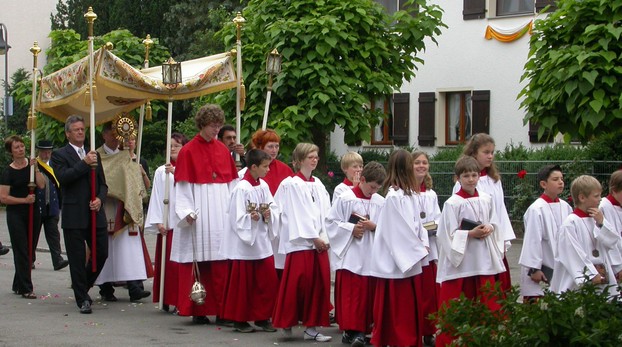 Frohnleichnam Procession (cc) Andreas Gaelle |
8th August Peace Festival
(in German: Friedensfest)
A very regional holiday that is only celebrated in the city of Augsburg. Its origin goes back to the 17th century and has its origin in the proclamation of the 'Peace Treaty of Westfalia' that ended the oppression of the protestants by the catholic majority. Nowadays it is a mixture of lectures, peace prices being awarded and happy celebrations in the street. If you are in the region on this date, make sure to pop by, in the end, how often do you see a whole city celebrate peace?
15th August Assumption Day
(in German: Mariä Himmelfahrt)
Another catholic holiday. And yes, the catholics have more days off in Germany than their protestant brothers and sisters! But we love them nevertheless ;-) It is a public holiday in the Saarland and in many parts of Bavaria.
This day celebrates the bodily assumption of Mary, the mother of Christ into heaven. As this is a purely catholic dogma, it is also only celebrated by the catholics in Germany. A few folklore traditions on this day are:
Processions with candles and lights, the largest takes place in Lindau (Bavaria) and even incorporates several ships that take the procession over the Lake Constance.
Blessing of medicinal herbs in the catholic churches.
31st October Reformation Day
(in German: Reformationstag)
Hey, finally, we protestants also have our very own public holiday in Germany! It is, surprise, surprise, only celebrated and observed in the predominantly protestant areas, namely: Brandenburg, Mecklenburg-Vorpommern, Saxony, Saxony-Anhalt, and Thuringia. The 31st October is the day when Martin Luther, the founder of the German reformation movement, nailed his 95 Thesis on the door of the Castle church in Wittenberg, in 1517. This event sparked in the end the reformation. The main discussion point was the reason of the salvation of man. Was it only by faith alone that mankind was saved or by faith and good works? This discussion spread widely, helped by the recently invented printing press and resulted in a split of Germany between catholic and protestant parties. It is only celebrated by the protestant churches in Germany, but not by the catholic ones. The day is dedicated to church services and celebrations, but has had no wider impact of the folklore in Germany. That it falls on the day of Halloween is a mere coincidence, Halloween is not widely celebrated in Germany and is often seen as an 'imported, new, American fashion'.
1st November All Saints
(in German: Allerheiligen)
Reformation Day is directly followed by a more ecumenical holiday, All Saints Day. A day in honor of all Saints and, in a wider sense a day of memory of all deceased. It is observed in Baden-Württemberg, Bavaria, Nordrhein-Westfalia, Rhineland-Palatinate and the Saarland and considered a silent holiday in these states.
This day came into being when the church started to have more saints than days to dedicate to them, its first mentioning was in the 8th century. Nowadays it has, especially in the protestant churches, gained more the aspect of the remembering of all the deceased, not only of the saints. In the end, only God knows, who has been a saint during his or her lifetime ;-) The names of the deceased of the last year are read in the churches and family and friends go to the cemeteries and visit the graves. Passing by a German cemetery at the evening of this holiday is certainly an eerie sight because of all the candles that are lit on the graves. One very special candle is used for this in Mainz, it is called a 'Newweling'. This name comes from the German word 'Nebel' for fog and refers to the fact that the weather in November in Germany is often foggy, especially around a city like Mainz, which is crossed by the river Rhine. So, the word 'Newweling' means, the thing that enlightens the fog. It is a curious candle that is made from strings of candlewax around a wick that in turn is winded around a wooden cone. The wax strings are produced and used in red, white, blue, yellow and green, which makes for very colorful candles to enlighten the cemeteries. This sounds all very complicated, but if you look at the right, you see a little slideshow I have put together to illustrate what 'Newwelings' are! Anotehr interesting aspect of them is that they go back at least to the 14th century. Today there are only produced by one family owned company and sold by another family at the cemeteries. You could say there exists a 'Newweling' monopoly in Mainz ;-)
Other German traditions include the giving as a present of a yeast bread, a sweet bread made from yeast dough and formed into a braid. This is eaten for breakfast on this day in many regions, especially in the south of Germany.
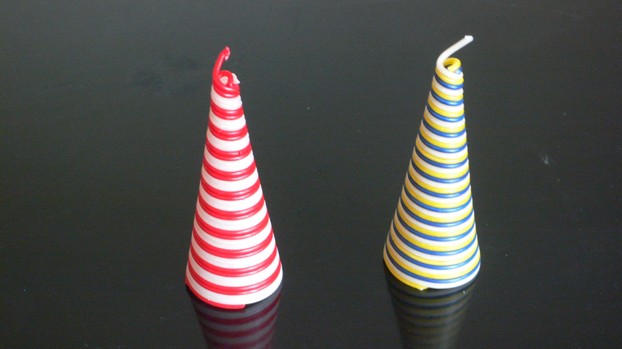 Newweling Candles |
Wednesday before 23th November Day of Repentance and Prayer
(in German: Buß- und Bettag)
This day is now only observed in Saxony and Bavaria, but only in Saxony it is a real holiday, in Bavaria it is only the schools close that day, but normal work life continues. It is more a protestant holiday and marks the end of the liturgical year of the protestant churches. After the re-unification of Germany it was abolished countrywide (it was a countrywide holiday from 1990-94) in order to finance the federal nursing care insurance, the (in)famous 'Pflegeversicherung'. Only in Saxony it remained a non-working holiday, they choose to increase some other financial charge instead. In Bavaria schools and public kindergartens are closed.
Whilst the word repentance often evokes negative feelings, perhaps it would be better to call or think of it as the day of re-orientation towards God. This day always falls between the 16th and 22nd November. Apart of church services and general sense of meditation, there are no special customs attached to this day.
Other holiday and seasons in Germany
'Rosenmontag' (see link below) is a de facto holiday in some towns and cities in Catholic western and southern Germany which have a strong Carnival tradition. De facto because a lot of employers take this day off. Carnival has especially in the Rhineland a strong following and a lot of Germans from this region consider it as unimaginable to work on this day.
Finally, the end of this mega article about German feast and holidays ;-)
So, I hope you enjoyed this travel through German traditions and customs when it comes to public holidays. Please leave a comment with whatever question, suggestion or praise you may have. If you liked it you, please feel free to give it a thumb up and to rate / share it ;-)
Do you want to know more about Germany? Read these books!
 |  |  |
| Easier Fatherland: Germany in the Twe... | Rick Steves' Germany 2012 | Soccernomics: Why England Loses, Why ... |
You might also like
Some of the best pubs and bars in Munich, GermanySteve Rogerson explores some of the best pubs and beer halls in the Bavarian ...
Beer and Sausages in NurembergGermany is famous for beer and sausages, but in Nuremberg the sausages and be...
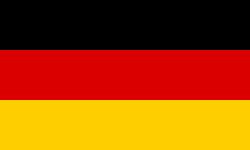










 How to Choose the Topic for your First Bookon 12/17/2012
How to Choose the Topic for your First Bookon 12/17/2012
 Why I published my first book on Amazon - and you should too ;-)on 11/30/2012
Why I published my first book on Amazon - and you should too ;-)on 11/30/2012
 What to do with Kids in Prague - Go To the ZOOon 10/30/2012
What to do with Kids in Prague - Go To the ZOOon 10/30/2012
 Choco Story Museum - Things to do with Kids in Pragueon 10/30/2012
Choco Story Museum - Things to do with Kids in Pragueon 10/30/2012

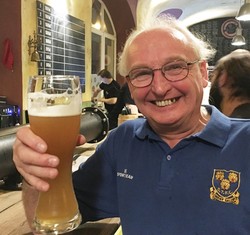
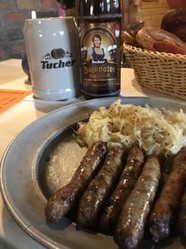
Comments
Thanks Moonbeam973,
I am glad that you found German Bank Holidays interesting ;-)